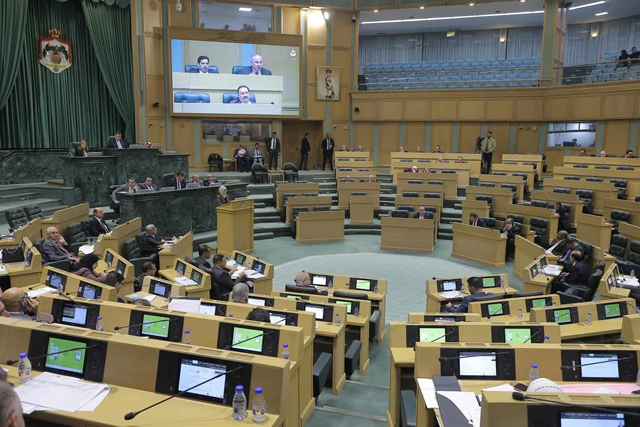You are here
Lower House approves amendments to 2024 Labour Law
By JT - Mar 10,2025 - Last updated at Mar 10,2025

The Lower House on Monday approves draft amendments to the 2024 Labour Law, with a majority voting in favour of key provisions, including adjustments to workers' benefits and protections (Petra photo)
AMMAN — The Lower House on Monday approved draft amendments to the 2024 Labour Law, with a majority voting in favour of key provisions, including adjustments to workers' benefits and protections.
The decision was taken during a session chaired by Speaker Ahmad Safadi and attended by Prime Minister Jaafar Hasan and other government officials, according to the Jordan News Agency, Petra.
One of the most notable changes is the reversal of a controversial provision that allowed employers to lay off up to 5 per cent of their workforce annually without the approval of the Ministry of Labour. Other revisions focus on improving worker rights, particularly in areas such as sick leave, maternity leave, and childcare.
Among the key amendments, Article 9 received approval, amending the original text of Article 65 to grant workers 14 days of sick leave per year with full pay. If hospitalisation or extended medical treatment is required, this leave can be extended for an additional 14 days with full pay, based on a doctor's report accredited by the institution.
Additionally, Article 10 was amended to include a new provision under Article 66, entitling workers to three days of paid leave in the event of the death of a first-degree relative.
In a move to better support female workers, the lawmakers also approved changes to Article 11, increasing maternity leave from 10 weeks to 90 consecutive days, reflecting a growing need for enhanced support for women during and after pregnancy.
In development for working parents, especially women, Article 12 now mandates that employers with 15 or more employees and at least 15 children under five years old in their workforce must provide suitable childcare facilities at no charge.
"These facilities must be supervised by qualified nannies, and employers are encouraged to collaborate with others in the same area to offer these services."
The most debated provision, Article 8, which initially allowed employers to reduce their workforce by up to 5 per cent annually without Ministry of Labour approval, was reversed after public and parliamentary pressure. The Chamber voted to reject any layoffs without ministry consent after some lawmakers called for further discussions on the matter.
These amendments are part of a broader effort to align Jordan’s labour laws with its social security systems, including recognising occupational diseases as work-related injuries and standardising the medical assessment process for such cases to benefit workers covered by social security and those not.
The amendments also address the growing need for better protections for foreign workers in Jordan, streamline procedures for dealing with labour violations, and ensure greater compliance with labour laws.
Related Articles
AMMAN — The Lower House on Wednesday continued its deliberations over the draft amendments to the 2024 Labour Law, passing an article that b
AMMAN — The Senate Labour and Social Development Committee, chaired by Senator Issa Murad, on Sunday approved a draft law amending the Labou
AMMAN — Amid increasing calls on the government to support working mothers with affordable daycare centres, an advocacy organisation has wel



















